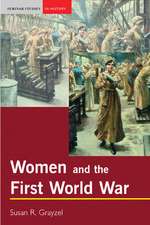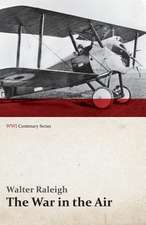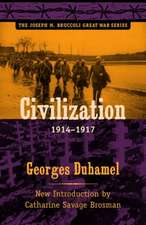The Last Great War: British Society and the First World War
Autor Adrian Gregoryen Limba Engleză Paperback – 15 oct 2008
| Toate formatele și edițiile | Preț | Express |
|---|---|---|
| Paperback (1) | 241.62 lei 6-8 săpt. | |
| Cambridge University Press – 15 oct 2008 | 241.62 lei 6-8 săpt. | |
| Hardback (1) | 720.58 lei 6-8 săpt. | |
| Cambridge University Press – 15 oct 2008 | 720.58 lei 6-8 săpt. |
Preț: 241.62 lei
Nou
Puncte Express: 362
Preț estimativ în valută:
46.23€ • 48.27$ • 38.26£
46.23€ • 48.27$ • 38.26£
Carte tipărită la comandă
Livrare economică 04-18 aprilie
Preluare comenzi: 021 569.72.76
Specificații
ISBN-13: 9780521728836
ISBN-10: 0521728835
Pagini: 364
Ilustrații: 18 b/w illus.
Dimensiuni: 153 x 227 x 18 mm
Greutate: 0.52 kg
Ediția:New.
Editura: Cambridge University Press
Colecția Cambridge University Press
Locul publicării:Cambridge, United Kingdom
ISBN-10: 0521728835
Pagini: 364
Ilustrații: 18 b/w illus.
Dimensiuni: 153 x 227 x 18 mm
Greutate: 0.52 kg
Ediția:New.
Editura: Cambridge University Press
Colecția Cambridge University Press
Locul publicării:Cambridge, United Kingdom
Cuprins
Introduction: the war that did not end all wars; 1. Going to war; 2. Defining the enemy: atrocities and propaganda; 3. From spectatorship to participation; volunteering to compulsion; 4. Economies of sacrifice; 5. Redemption through war: religion and the languages of sacrifice; 6. The conditional sacrifices of labour; 7. The Last War: 1917-?; Conclusion.
Recenzii
'Adrian Gregory has provided the best brief account we have of the history of the Great War. Using an astonishing array of sources uncovering wartime life at the front and at home, Gregory tells the story of the war in a manner which is engaging, combative, and authoritative. Here is an original, tough-minded and thoughtful book, written by an historian unafraid of exploding the myths which still surround the 1914–18 conflict.' Jay Winter, Yale University
'In a series of brilliant, well-argued and powerfully humane thematic chapters, Gregory transforms our understanding of how Britons went to war, how they persevered despite growing anger at unequal 'sacrifices', and, crucially, how victory allowed them to transcend the traumas and the hatreds of war by embracing the lie that bereavement and sacrifice had been universal. Throughout, Gregory places experience of life on the home front, in all its rich diversity, centre-stage.' Jon Lawrence, Emmanuel College, Cambridge
'The Last Great War is the most important book on the British Home Front of the First World War to appear since Arthur Marwick's The Deluge, published over 40 years ago, which it largely supersedes. In particular, Adrian Gregory's revision of the idea of 'war enthusiasm' is subtle and persuasive. This is an outstanding work by a major historian.' Gary Sheffield, University of Birmingham
'At first glance, one wonders if we need another book about Britain and the First World War. After reading Adrian Gregory's The Last Great War, it is clear that we do. It offers a stirring reminder of the importance of studying the war on its own terms, not its popular legacy. By taking on some well-entrenched orthodoxies about what the First World War meant, the book will provoke renewed discussion and debate about this pivotal event.' Susan Grayzel, University of Mississippi
'In his fascinating book, The Last Great War, Adrian Gregory demonstrates that the notion that Britain was carried to war on a wave of patriotic enthusiasm is false … It is true that some wanted to fight, and others saw war as a more exciting prospect than working in a dead-end office job. But Gregory shows that voluntarism wasn't all that it seemed.' George Monbiot, The Guardian
'… there is much material presented here that does explode many of the myths surrounding the First World War, through the extensive collection of personal documents, and giving more of a view 'from the shop floor'.' Tribune
'This fascinating, deeply revisionist study sets quite a few received opinions on their heads with its imagination, verve, and extensive use of sources, most of which come, by dint of availability, from the middle class - correspondence, diaries, newspapers, and local records … This is an important and exciting book … allowing us to better understand the past.' The Journal of Interdisciplinary History
'This is a very interesting study of the British Home Front during the First World War which looks at how the British public felt about the war and how this changed as the conflict progressed. … Gregory provides a sensible, balanced viewpoint, which emphasises the complexities inherent in talking about the feelings and motivation of a whole nation.' The Bulletin of the Military Historical Society
'Adrian Gregory has written a marvellous, interesting, detailed book. One that casts a new light on the Last Great War, not from the perspective of the Western Front but from the nation at home. It calls into question and provides fresh insight into many of the myths and accepted conclusions promoted by some historians' work.' Open History
'Adrian Gregory has written a marvellous, interesting, detailed book … No serious military or social historian can afford to ignore it.' Open History
'Adrian Gregory is one of the best historians of the British Home Front that we have. What he's been able to do is to pull together the social history of the First World War - with a very good understanding of the dynamics of the war itself as well - and put it all into a package. This book is, I think, the best single volume book on the British Home Front in the First World War.' Jonathan Boff, Five Books (www.fivebooks.com)
'In a series of brilliant, well-argued and powerfully humane thematic chapters, Gregory transforms our understanding of how Britons went to war, how they persevered despite growing anger at unequal 'sacrifices', and, crucially, how victory allowed them to transcend the traumas and the hatreds of war by embracing the lie that bereavement and sacrifice had been universal. Throughout, Gregory places experience of life on the home front, in all its rich diversity, centre-stage.' Jon Lawrence, Emmanuel College, Cambridge
'The Last Great War is the most important book on the British Home Front of the First World War to appear since Arthur Marwick's The Deluge, published over 40 years ago, which it largely supersedes. In particular, Adrian Gregory's revision of the idea of 'war enthusiasm' is subtle and persuasive. This is an outstanding work by a major historian.' Gary Sheffield, University of Birmingham
'At first glance, one wonders if we need another book about Britain and the First World War. After reading Adrian Gregory's The Last Great War, it is clear that we do. It offers a stirring reminder of the importance of studying the war on its own terms, not its popular legacy. By taking on some well-entrenched orthodoxies about what the First World War meant, the book will provoke renewed discussion and debate about this pivotal event.' Susan Grayzel, University of Mississippi
'In his fascinating book, The Last Great War, Adrian Gregory demonstrates that the notion that Britain was carried to war on a wave of patriotic enthusiasm is false … It is true that some wanted to fight, and others saw war as a more exciting prospect than working in a dead-end office job. But Gregory shows that voluntarism wasn't all that it seemed.' George Monbiot, The Guardian
'… there is much material presented here that does explode many of the myths surrounding the First World War, through the extensive collection of personal documents, and giving more of a view 'from the shop floor'.' Tribune
'This fascinating, deeply revisionist study sets quite a few received opinions on their heads with its imagination, verve, and extensive use of sources, most of which come, by dint of availability, from the middle class - correspondence, diaries, newspapers, and local records … This is an important and exciting book … allowing us to better understand the past.' The Journal of Interdisciplinary History
'This is a very interesting study of the British Home Front during the First World War which looks at how the British public felt about the war and how this changed as the conflict progressed. … Gregory provides a sensible, balanced viewpoint, which emphasises the complexities inherent in talking about the feelings and motivation of a whole nation.' The Bulletin of the Military Historical Society
'Adrian Gregory has written a marvellous, interesting, detailed book. One that casts a new light on the Last Great War, not from the perspective of the Western Front but from the nation at home. It calls into question and provides fresh insight into many of the myths and accepted conclusions promoted by some historians' work.' Open History
'Adrian Gregory has written a marvellous, interesting, detailed book … No serious military or social historian can afford to ignore it.' Open History
'Adrian Gregory is one of the best historians of the British Home Front that we have. What he's been able to do is to pull together the social history of the First World War - with a very good understanding of the dynamics of the war itself as well - and put it all into a package. This book is, I think, the best single volume book on the British Home Front in the First World War.' Jonathan Boff, Five Books (www.fivebooks.com)
Notă biografică
Descriere
A groundbreaking new history of the British home front during the First World War.














